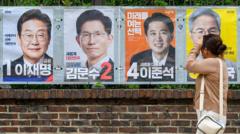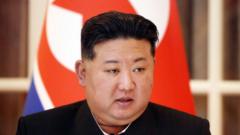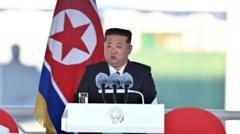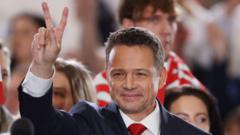Following the impeachment of Yoon Suk Yeol, South Korea gears up for a snap presidential election on June 3, with pressing political divisions and socio-economic issues at stake. Frontrunner Lee Jae-myung faces off against Kim Moon-soo, as the nation navigates complex relations with North Korea and declining birth rates.
South Korea Prepares for Pivotal Presidential Election Following Historic Impeachment

South Korea Prepares for Pivotal Presidential Election Following Historic Impeachment
The nation will vote on June 3 to select a new leader after Yoon Suk Yeol's controversial departure, amid crucial political and economic challenges.
As South Korea approaches a snap presidential election on June 3, the political landscape has been transformed following the recent impeachment of former president Yoon Suk Yeol. His removal from office, a result of declaring martial law for six hours last December, has created significant turmoil within the country and highlighted the division among its populace.
Yoon was expected to serve until 2027, yet his controversial actions led to his swift downfall after being impeached by parliament on April 4. This unprecedented political climate has seen three individuals serve as acting presidents in the interim, showcasing the instability within the government.
The upcoming election will not only determine the country's next leader but will also address critical issues stemming from Yoon's administration. As tensions remain high with North Korea, characterized by propaganda aerial exchanges, the new president will need to navigate these relations alongside managing public confidence in a shaky economy magnified by external pressures, including tariffs imposed by the United States.
Among the pressing challenges is South Korea’s declining birth rate, which remains one of the lowest in the world, resulting in demographic concerns that threaten the country’s future stability. Recent statistics show that the fertility rate stood at a mere 0.75 in 2024, far below the 2.1 threshold needed for population maintenance.
The leading candidates for the presidency include Lee Jae-myung of the liberal Democratic Party, who is viewed as a champion of the working class, and Kim Moon-soo from the conservative People Power Party, who advocates for an economy-focused agenda. Both candidates bring differing visions for the future of South Korea, and their approaches to dealing with the fallout from Yoon's presidency will be pivotal.
In a break from tradition, there are no female candidates running for president this election cycle—marking a departure from the previous 18 years where women held a presence in the race. This election's outcome is expected to be closely contested and is set against a backdrop of heightened public stakes due to the unprecedented shift in governance.
With polling set to take place from 06:00 to 20:00 local time on June 3, enabling overseas citizens to vote early, results will likely emerge soon after the polls close. The victor will assume the presidency immediately, stepping into a turbulent political arena that will require swift action to address both current and long-standing issues faced by the nation—a task made even more urgent given the potential repercussions of Yoon's actions and the legal challenges he now faces following his impeachment.

















